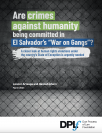President Nayib Bukele has become known for reducing gang-related criminality in El Salvador. But as national and international organizations have warned with increasing alarm, this security has come at a high cost for human rights.
To bring down El Salvador’s murder rate, Bukele’s government instituted a continually extended state of emergency, which reaches its two-year anniversary, allowing to arrest anyone, arbitrarily and without due process, for being suspected gang members. In addition to mass arbitrary detentions, civil society groups have documented torture, enforced disappearances, and extrajudicial executions.
In this article DPLF argues that some of the grave human rights violations being committed under the state of emergency may constitute crimes against humanity, due to their widespread and systematic nature, and that they appear to be part of a coordinated policy utilized against a civilian population.
Crimes against humanity are one of the international crimes that can be investigated and tried by the International Criminal Court (ICC), which acts as a court of last resort when national justice systems fail to adequately investigate and prosecute crimes falling within their jurisdiction --which seems to be the current case in El Salvador.
While it is too early to say definitively whether the abuses being documented in El Salvador constitute crimes against humanity, as this article posits, a thorough investigation through an international criminal law lens is needed to do so. Given the current context in El Salvador, carrying out such an investigation will be complex and require extensive resources and support from the international community.
Read the full article here.






